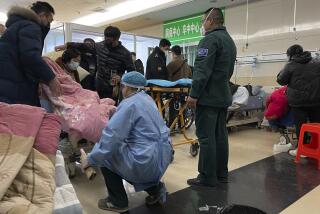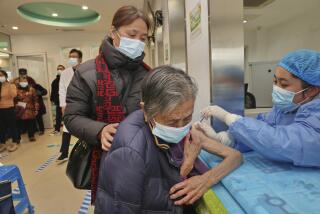Tracing the Path of SARS: A Tale of Deadly Infection
- Share via
GUANGZHOU, China — As far as Pang Zuoyao is concerned, he caught a bad case of flu late last year and recovered. But his doctors believe he might have been the first victim of a deadly new virus that has hopscotched with alarming speed from southern China to the rest of the country and the world.
“They say it’s very contagious, but I’m OK and my family is OK,” the 46-year-old village cadre said by phone from his home in Foshan, near Guangzhou, the capital of Guangdong province. “I don’t even know if I am related to what happened elsewhere. The day I left the hospital, they said they didn’t know what I had.”
That’s because Pang got sick in November, and doctors didn’t yet have a name for what they now call SARS, or severe acute respiratory syndrome.
“He had a fever for nine days. We treated it as a common cold at first,” said Wu Min, the doctor who cared for Pang. “Then he had trouble breathing. We sent him to the ICU.”
By then, Pang apparently had passed the disease to his wife, his aunt and his aunt’s daughter.
“All of them have recovered,” Wu said.
If only things had stopped there.
But a look at the growing casualty list reveals SARS as a disease that knows no boundaries of nation or class and thrives particularly among the diversity of lives on the move in contemporary China.
*
After Pang fell ill, cases similar to his started popping up around Guangdong, and medical professionals in close contact with those patients began to sicken as well. Then, one of those doctors from Guangzhou traveled to nearby Hong Kong in February to attend a wedding. There, he infected international travelers who stayed in his hotel and spread the disease to Canada, Singapore and Vietnam, triggering a chain reaction of fear around the world.
By now, the pneumonia-like illness has afflicted people in about 25 countries, infecting about 3,900 people and killing at least 217. The United States reports 39 confirmed and at least 184 suspected cases, but no deaths.
The potential global epidemic might not have spread so quickly, critics say, if Chinese authorities had been more aggressive in sharing information about the outbreak during its early stages. The rest of the world did not know about the disease until the World Health Organization issued a rare global warning in mid-March. China continued to hide the true scale of the outbreak until Sunday, when officials suddenly reversed course and admitted to a nearly tenfold spike in SARS cases in the Chinese capital. Beijing’s reported cases jumped from 37 last week to 482 on Monday, with more than 400 suspected cases. That raised the national death toll to 92 and infections to more than 2,000.
To underscore the government’s new resolve to battle the escalating crisis, the nation’s health minister and the mayor of Beijing were fired Sunday in one of the most high-profile purges in recent memory. Officials also canceled the lucrative “golden week” national holiday in May to prevent tens of millions of people from traveling around the country and spreading the disease.
But skeptics wonder whether these actions, taken nearly six months after the start of the outbreak, are too little, too late. Official tardiness is particularly disturbing as the disease quickly makes its way to the poorer inland provinces, where the sick are hard to track and medical facilities tend to be primitive.
Henk Bekedam, the WHO representative in China, said Monday that he feared “a very big outbreak in the country.”
*
The first American to catch SARS in China and die from it was James Salisbury, who came here last year to accept a temporary teaching job at a polytechnic school in Shenzhen, just across the border from Hong Kong.
No one knows for sure how Salisbury contracted the disease. His daughter, Michelle Salisbury, said her father, like the rest of the family, was a Mormon from Utah. There are no Mormon churches in Shenzhen, so he frequently crossed into Hong Kong to attend weekend services at the Church of Jesus Christ of Latter-day Saints there.
“My father is not the kind of person who would lock himself up in the house just because something crazy is going on in the world,” Michelle Salisbury said.
James Salisbury fell ill in China and was in a Shenzhen hospital until earlier this month, when his family requested that he be moved to Hong Kong for better care. Salisbury died in transit, leaving behind a 6-year old son, Mickey, who also showed symptoms of SARS and is under quarantine at a Hong Kong hospital.
Mickey’s mother is a Chinese woman Salisbury had earlier met and married in China.
She remains in Utah with the couple’s young triplets -- girls who were born in China but require care in the U.S. for eye problems. She had hoped to reunite the family in China if her husband’s teaching job became permanent.
Another U.S. victim of SARS was a Chinese American who lived in Shanghai and worked for a New York-based garment maker. On his way to Vietnam to inspect a blue jeans factory, Johnny Chen had to stop over in Hong Kong, because there are no direct flights from Shanghai to Hanoi. In Hong Kong, he stayed at the Metropole Hotel, where the Guangdong doctor infected about a dozen visitors. Chen was hospitalized in Hanoi and then transferred back to Hong Kong, where he apparently infected scores of others in what is now the city worst-affected by SARS, with more than 1,400 people infected and 94 dead.
Another foreigner sickened by the Guangdong doctor in Hong Kong was a 78-year-old Canadian tourist, who passed the virus to her 44-year-old son in Toronto. Both have died and infected others in what is the hardest-hit country outside Asia, with 12 dead and 132 ill.
*
The high level of attention paid to international travelers has helped the world identify the disease’s possible modes of transmission. But little is known about its spread inside the world’s most populous country.
Until recently, the Chinese government had ordered a media blackout on the epidemic except for brief announcements stating that everything was under control. Without more reliable official information, people depended on the Internet and word of mouth to find out what they could about the virus’ destructive path.
The Web site of the official People’s Daily, for instance, reported that a migrant worker from Sichuan province in the southwest fell ill with the virus while traveling home on a bus from Guangdong. When the bus pulled over to refuel, passengers found him dead in his seat.
Many other SARS cases in the Chinese interior have been traced to migrant workers who take jobs in wealthy coastal cities and go home to seek cheaper medical care.
Health officials in Gansu province in the northwest said their two SARS patients are migrant workers in the Chinese capital who journeyed home after developing symptoms. Provincial authorities are conducting a nationwide search for people who traveled on their flight and train.
*
Elsewhere, a 35-year-old woman from the northern province of Henan had been hired as a bedside assistant in Beijing for two SARS patients. After feeling sick, she hopped on a train and checked into a hospital back home with full-blown SARS.
A health official in the northeastern province of Jilin reported its first cases Monday: A woman visited a Beijing hospital to look after a pregnant patient, developed symptoms on her return and then passed the virus to her sister.
A family of six siblings from the eastern cities of Beijing, Shanghai and Hangzhou gathered to sweep their ancestors’ graves in Wuhan in the east-central province of Hubei. While there, the older sister, from Beijing, fell ill. The others took her to a local hospital, where doctors said her symptoms were nothing unusual.
They all went home. The sister got sicker and became a confirmed SARS case in Beijing. The same thing happened to three of her siblings in Hangzhou, according to a local newspaper’s Web site.
*
Residents of the Chinese capital are bracing for the city’s confirmed cases to soar in the coming days.
Growing paranoia has turned elite colleges into menaces. According to students at Beijing University, classes were canceled and students scurried home after a professor became a suspected carrier by taking care of her mother, a SARS victim who had been visiting from Inner Mongolia.
“The situation is going to get worse before it gets better,” said Sydney Chang, past president of the American Chamber of Commerce in Shanghai. China’s most cosmopolitan and image-conscious city still claims that it has only two cases of SARS, a number few believe.
“It’s very upsetting they keep saying everything is OK,” Chang said.
“The biggest problem is transparency. If you are not transparent, who is going to trust you?”
More to Read
Sign up for Essential California
The most important California stories and recommendations in your inbox every morning.
You may occasionally receive promotional content from the Los Angeles Times.













